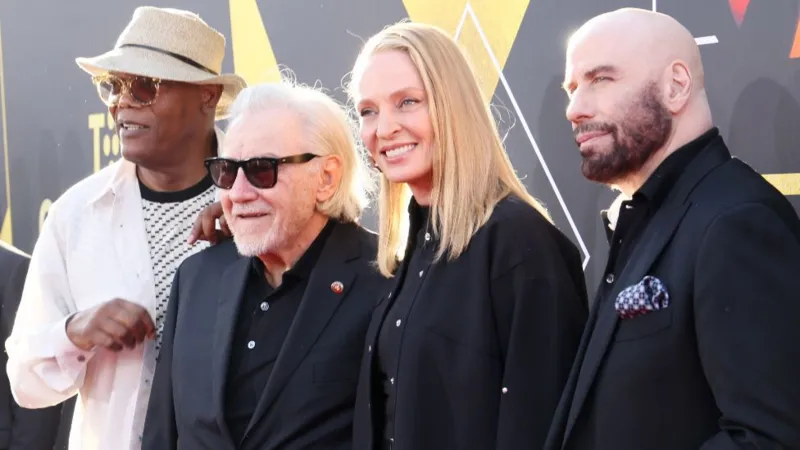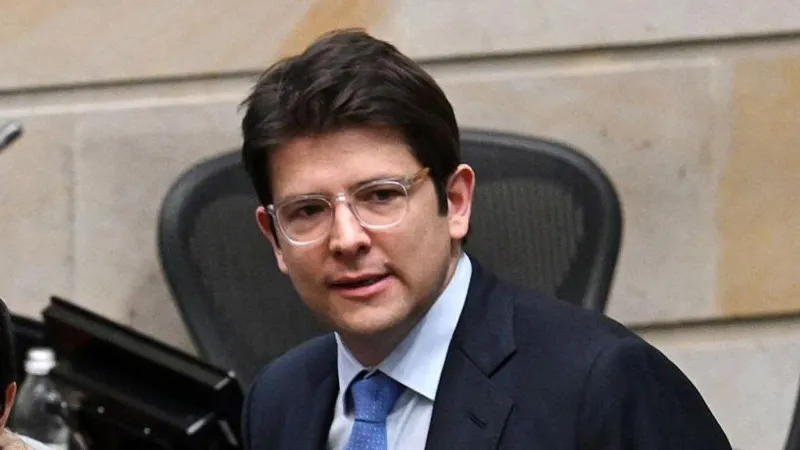Everything we know about Quentin Tarantino's 10th and final film
The cast of Pulp Fiction gathered earlier this week to celebrate three decades since the first screening of Quentin Tarantino's 1994 classic.

But as John Travolta, Uma Thurman, Samuel L Jackson and Harvey Keitel were posing for photos in Los Angeles, news was emerging about a different Tarantino film.
Hollywood trade publications reported the influential director had scrapped the idea for his forthcoming 10th movie and gone back to the drawing board.
The Movie Critic had been set to follow a writer who reviewed films for an adult magazine, but the whole premise will now change.
Interest in Tarantino's next movie is particularly high - because it is due to be his last.
Tarantino has spoken many times over the years about his desire to only direct 10 films in his career, including in a 2022 interview with CNN's Chris Wallace.
"I’ve been doing it for a long time," he explained. "I’ve been doing it for 30 years, and it’s time to wrap up the show.
"I'm an entertainer: I want to leave you wanting more and not just work – and I don’t want to work to diminishing returns."
He added: "I don’t want to become this old man who’s out of touch, when already I’m feeling a bit like an old man out of touch when it comes to the current movies that are out right now."
Many film fans respect his decision to retire before he burns out, but not everyone agrees his work would start going downhill if he continued.
One Twitter user commented this week that concerns about declining quality were "no excuse when 2023 alone had Martin Scorsese, Hayao Miyazaki, Michael Mann, & Ridley Scott show why they’re still some of the best working filmmakers today... and all over 80".
Others have accepted Tarantino's decision - and are happy to wait for him to get his final film right, such as awards pundit Matt Neglia, editor-in-chief of Next Best Picture.
"Let Tarantino cook," he said, "as long as it’s not another western. I want to see him tackle something different for his 'final' film."
Pam Grier, who starred in Jackie Brown, joined Tarantino when he got his star on the Hollywood Walk of Fame
So far, Tarantino has directed nine of his proposed 10 films - with a few caveats.
Kill Bill Volume One and Two were released as two separate films, and if you were to count them both, then Tarantino has already directed his 10th.
But he says he counts them as one film, because that's how they were originally intended and the two parts were filmed in one go.
His credits to date also don't take into account the various films Tarantino has written, co-written or produced - such as Natarual Born Killers and True Romance - it only refers to films he has directed solo.
He has previously made films which spanned various different genres - including westerns, thrillers, comedies, dramas and martial arts.
Tarantino's first nine films so far are, in order:
- Reservoir Dogs (1992)
- Pulp Fiction (1994)
- Jackie Brown (1997)
- Kill Bill Volume 1 (2003) and Volume 2 (2004) - counted as one film
- Death Proof (2007)
- Inglourious Basterds (2009)
- Django Unchained (2012)
- The Hateful Eight (2015)
- Once Upon a Time in Hollywood (2019)
It's worth remembering that Tarantino has never won best director at the Oscars. So if voters want to ensure his place in Academy history, this will be their last chance to give him the trophy.
Tarantino’s dropped final project was titled The Movie Critic and said to be partly autobiographical.
Due to be his first film since 2019’s nostalgic Once Upon a Time in Hollywood, it similarly looked set to indulge his idiosyncratic love of cinema.
Speaking to Deadline’s Baz Bamigboye last year, he said the film would be set in late 1970s California and based on an adult magazine’s movie critic who Tarantino enjoyed reading when loading vending machines for money as a teen.
"All the other stuff was too skanky to read, but then there was this porno rag that had a really interesting movie page," he explained.
Tarantino described the magazine's critic as "very funny, rude and cynical", adding: "He wrote like he was 55 but he was only in his early to mid-30s. He died in his late 30s."
He revealed the shelved script presented the unnamed writer as someone "who really lived but was never really famous".
It was rumoured the director had again enlisted Brad Pitt for the lead role, in what would be their third full partnership after Inglourious Basterds and Once Upon a Time.
But Tarantino later said nobody had officially been cast, and that he had decided to look for someone closer to 35 years old to play the titular character.
Pitt, 60, remained attached to the project, with some speculating that he would instead feature as an older version of the character, or as one of the magazine’s editors.
In true movie-buff style there were rumours that other cast members from Tarantino's previous films would also make an appearance to complete the homage.
In short, it seems Tarantino was unhappy with the script - even after reportedly rewriting it - and has gone back to the drawing board for his apparent swansong.
The move is a surprise, however it isn’t the first time the director has pulled a production.
A decade back, he shelved The Hateful Eight after an early script leaked when an actor shared a copy with a representative.
Enraged at the rough draft hitting the internet, Tarantino only returned to the project after a table reading for charity received a rapturous reception.
This present situation with The Movie Critic, however, appears purely artistic. Ever the perfectionist, if this really is to be Tarantino’s last film, he will want to go out with a bang.
Jamie Foxx starred in Django Unchained, which won two of the five Oscars it was nominated for
Tarantino is, quite simply, one of the most acclaimed and influential directors of recent decades.
Entire books and documentaries have been released over the years dedicated to examining his distinctive style and craft.
Many actors are desperate to work with him and his films feature plenty of A-listers as a result, including Leonardo DiCaprio, Jamie Foxx, Brad Pitt, Uma Thurman, Margot Robbie and Samuel L Jackson.
But Tarantino has also helped launch the careers of young actors, or boost the careers of those whose star was starting to fade, such as John Travolta, Robert Forster and Pam Grier.
Even if you've never seen a Tarantino film, you'd probably recognise some of his work. Pop culture is littered with references to him across music, film and television.
Famous Tarantino scenes have been referenced everywhere from The Simpsons and Team America to Kung Fu Panda and Shrek, as well as the video for Lady Gaga and Beyonce's Telephone.
Music plays a key part in his directing style - songs Tarantino has chosen to soundtrack his films often develop cult followings in their own right.
This terrific interview with Tarantino conducted by the BBC's Ali Plumb spins through his impact on culture.
Tarantino built a cult following as Hollywood’s enfant terrible in the ‘90s, lauded by some as the voice of a generation following Pulp Fiction.
But the decades since have not been without controversy – in particular, sensitivity to the racial slurs written into his films.
The director’s liberal use the N-word in past scripts has led some to retrospectively question the motivation, including whether he cheapened the insult by using it as a provocative device.
Tarantino’s critics often point to Django Unchained – his slave redemption fantasy - as a prime example, since it features the racial slur more than 100 times.
However, Tarantino’s writing has been defended by long-time acting partners – including black actors Samuel L Jackson and Jamie Foxx - as simply reflecting the realistic speech patterns of the characters in question.
Foxx, who stars as Django Unchained’s protagonist, told Yahoo Entertainment: "I understood the text... that’s the way it was back in that time."
Jackson, meanwhile, has been even more bullish about that backlash over the years.
Speaking to Esquire magazine in 2019, he said: "You can’t just tell a writer he can’t talk, write the words, put the words in the mouths of the people from their ethnicities, the way that they use their words."
Tarantino, for his part, has been unrepentant, telling broadcaster Chris Wallace that offended movie-goers should "see something else".
"If you have a problem with my movies, then they aren’t the movies to go see. Apparently, I’m not making them for you," he said.
The director has given similarly short shrift to complaints over the levels of violence in his films. When pressed over the relationship between onscreen and real-life brutality by Channel 4 News’ Krishnan Guru-Murthy, he famously replied: "I refuse your question... I’m shutting your butt down!"
Margot Robbie, Leonardo DiCaprio and Brad Pitt stared in Tarantino's last film in 2019
One thing he has apologised for, however, is his treatment of Kill Bill star and long-time collaborator Uma Thurman.
In a 2018 interview with The New York Times, the actress alleged he persuaded her to film a driving scene that ultimately went wrong - resulting in a high-speed crash that caused her lasting injuries.
Tarantino described it as "one of the biggest regrets of my life", saying his failure to properly test the route beforehand as "one of my most horrendous mistakes".
"I didn't force her into the car. She got into the car because she trusted me. And she believed me... I told her it would be safe. And it wasn't. I was wrong."
Separately, Tarantino also told The New York Times of his regret over the sexual assaults of film producer Harvey Weinstein.
"I knew enough to do more than I did,” Tarantino said of the disgraced mogul, who was behind a number of his films. "I wish I had taken responsibility for what I heard."
-bbc






